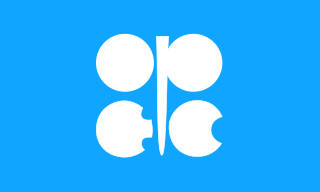
The Organization of the Petroleum Exporting Countries is a cartel enabling the co-operation of leading oil-producing and oil-dependent countries in order to collectively influence the global oil market and maximize profit. It was founded on 14 September 1960 in Baghdad by the first five members. The organization, which currently comprises 12 member countries, accounted for an estimated 30 percent of global oil production. A 2022 report further details that OPEC member countries were responsible for approximately 38 percent of it. Additionally, it is estimated that 79.5 percent of the world's proven oil reserves are located within OPEC nations, with the Middle East alone accounting for 67.2 percent of OPEC's total reserves.
Sources include: Dow Jones (DJ), New York Times (NYT), Wall Street Journal (WSJ), and the Washington Post (WP).
For further details see the "Energy crisis" series by Facts on File.

Oil reserves in Iraq are considered the world's fifth-largest proven oil reserves, with 140 billion barrels.

The proven oil reserves in Venezuela are recognized as the largest in the world, totaling 300 billion barrels (4.8×1010 m3) as of 1 January 2014. The 2019 edition of the BP Statistical Review of World Energy reports the total proved reserves of 303.3 billion barrels for Venezuela (slightly more than Saudi Arabia's 297.7 billion barrels).
There have been widely varying estimates of proven oil reserves in Russia. Most estimates included only Western Siberian reserves, which have been exploited since the 1970s and supply two-thirds of Russian oil. However, there are potentially huge reserves elsewhere. In 2005, the Russian Ministry of Natural Resources estimated that another 4.7 billion barrels of oil exist in Eastern Siberia. In July 2013, the Russian Natural Resources Ministry made official estimates of reserves available for the first time. According to Russian Natural Resources Minister Sergey Donskoy, as of 1 January 2012, recoverable reserves of oil in Russia under category ABC1 were 17.8 billion tons and category C2 reserves were 10.9 billion tons.
Sources include: Dow Jones (DJ), New York Times (NYT), Wall Street Journal (WSJ), and the Washington Post (WP).
Venezuela is a major producer and exporter of minerals, notably bauxite, coal, gold, iron ore, and oil, and the state controls most of the country's vast mineral reserves. In 2003 estimated reserves of bauxite totaled 5.2 million tons.

Iran is an energy superpower and the petroleum industry in Iran plays an important part in it. In 2004, Iran produced 5.1 percent of the world's total crude oil, which generated revenues of US$25 billion to US$30 billion and was the country's primary source of foreign currency. At 2006 levels of production, oil proceeds represented about 18.7% of gross domestic product (GDP). However, the importance of the hydrocarbon sector to Iran's economy has been far greater. The oil and gas industry has been the engine of economic growth, directly affecting public development projects, the government's annual budget, and most foreign exchange sources.
Energy in Iraq plays a crucial role in both the national economy and the global energy markets due to the country's vast oil reserves and significant status within the Organization of the Petroleum Exporting Countries (OPEC).
Iraq's large oil reserves have attracted attention from the United Kingdom, a country with a high demand for oil. British involvement in the Iraqi oil industry dates to World War I. Political influence in the region has given the UK the power to establish a number of oil companies in Iraq.
This page is based on this
Wikipedia article Text is available under the
CC BY-SA 4.0 license; additional terms may apply.
Images, videos and audio are available under their respective licenses.



